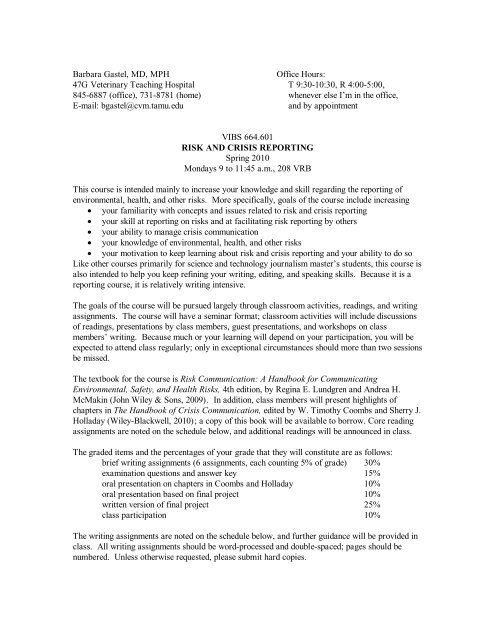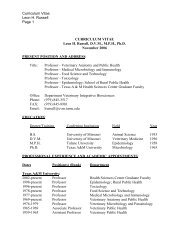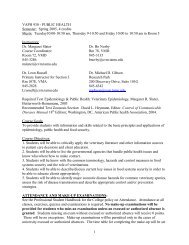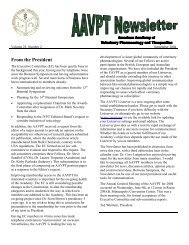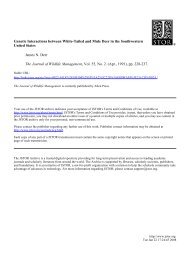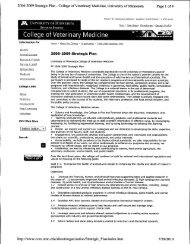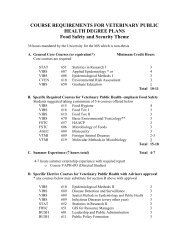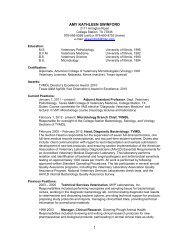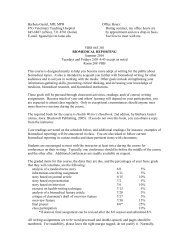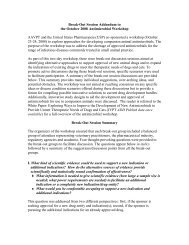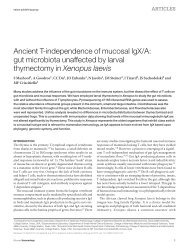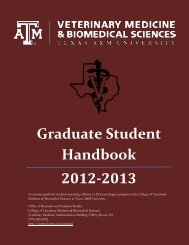Barbara Gastel, MD, MPH Office Hours: 47G Veterinary Teaching ...
Barbara Gastel, MD, MPH Office Hours: 47G Veterinary Teaching ...
Barbara Gastel, MD, MPH Office Hours: 47G Veterinary Teaching ...
Create successful ePaper yourself
Turn your PDF publications into a flip-book with our unique Google optimized e-Paper software.
<strong>Barbara</strong> <strong>Gastel</strong>, <strong>MD</strong>, <strong>MPH</strong> <strong>Office</strong> <strong>Hours</strong>:<br />
<strong>47G</strong> <strong>Veterinary</strong> <strong>Teaching</strong> Hospital T 9:30-10:30, R 4:00-5:00,<br />
845-6887 (office), 731-8781 (home) whenever else I’m in the office,<br />
E-mail: bgastel@cvm.tamu.edu and by appointment<br />
VIBS 664.601<br />
RISK AND CRISIS REPORTING<br />
Spring 2010<br />
Mondays 9 to 11:45 a.m., 208 VRB<br />
This course is intended mainly to increase your knowledge and skill regarding the reporting of<br />
environmental, health, and other risks. More specifically, goals of the course include increasing<br />
• your familiarity with concepts and issues related to risk and crisis reporting<br />
• your skill at reporting on risks and at facilitating risk reporting by others<br />
• your ability to manage crisis communication<br />
• your knowledge of environmental, health, and other risks<br />
• your motivation to keep learning about risk and crisis reporting and your ability to do so<br />
Like other courses primarily for science and technology journalism master’s students, this course is<br />
also intended to help you keep refining your writing, editing, and speaking skills. Because it is a<br />
reporting course, it is relatively writing intensive.<br />
The goals of the course will be pursued largely through classroom activities, readings, and writing<br />
assignments. The course will have a seminar format; classroom activities will include discussions<br />
of readings, presentations by class members, guest presentations, and workshops on class<br />
members’ writing. Because much or your learning will depend on your participation, you will be<br />
expected to attend class regularly; only in exceptional circumstances should more than two sessions<br />
be missed.<br />
The textbook for the course is Risk Communication: A Handbook for Communicating<br />
Environmental, Safety, and Health Risks, 4th edition, by Regina E. Lundgren and Andrea H.<br />
McMakin (John Wiley & Sons, 2009). In addition, class members will present highlights of<br />
chapters in The Handbook of Crisis Communication, edited by W. Timothy Coombs and Sherry J.<br />
Holladay (Wiley-Blackwell, 2010); a copy of this book will be available to borrow. Core reading<br />
assignments are noted on the schedule below, and additional readings will be announced in class.<br />
The graded items and the percentages of your grade that they will constitute are as follows:<br />
brief writing assignments (6 assignments, each counting 5% of grade) 30%<br />
examination questions and answer key 15%<br />
oral presentation on chapters in Coombs and Holladay 10%<br />
oral presentation based on final project 10%<br />
written version of final project 25%<br />
class participation 10%<br />
The writing assignments are noted on the schedule below, and further guidance will be provided in<br />
class. All writing assignments should be word-processed and double-spaced; pages should be<br />
numbered. Unless otherwise requested, please submit hard copies.
Grading of assignments will be as follows: A+:98, A:95, A-:92, B+:88, B:85, B-:82, etc. To<br />
receive a grade in the A range, work must be of professional quality.<br />
The success of a course such as this one depends on contributions from the students as well as<br />
from the teacher. Suggestions for making the course more educational and more enjoyable are<br />
appreciated at any time.<br />
TENTATIVE SCHEDULE<br />
Session/Date Main Activities and Assignments<br />
1 Introduction to the Course<br />
Jan 25 Highlights of Some Chapters on Basics of Risk and Crisis Communication<br />
(may be continued next week)<br />
2 Discussion: Reading for Today<br />
Feb 1 Workshop: Writing for Today<br />
Introduction: Plans for Student Presentations on Coombs and Holladay Chapters<br />
Core Reading Due: textbook chapters 1-5<br />
Writing Due: highlights of reading for this week<br />
3 Discussion: Reading for Today<br />
Feb 8 Workshop: Writing for Today<br />
In-Class Reading and Discussion: Some Examples of Risk Reporting<br />
Core Reading Due: textbook chapters 6-9<br />
Writing Due: brief assignment related to the reading<br />
4 Discussion/Workshop: Reading and Writing for Today<br />
Feb 15 Viewing and Discussion: Documentary on a Risk or Crisis<br />
Core Reading Due: textbook chapters 10-13<br />
Writing Due: brief assignment related to the reading<br />
5 Discussion: Some Relevant Highlights of the American Association for the<br />
Feb 22 Advancement of Science Annual Meeting<br />
Discussion/Workshop: Reading and Writing for Today<br />
Student Presentation on Coombs and Holladay, introduction and chapters 1-3<br />
Core Reading Due: textbook chapters 14-16<br />
Writing Due: news report on a relevant session at the AAAS annual meeting<br />
or brief assignment related to the reading<br />
Note: If desired, the final version of this writing assignment<br />
can be submitted as late as noon, Friday, February 26.<br />
6 Discussion/Workshop: Reading and Writing for Today<br />
Mar 1 Student Presentation on Coombs and Holladay, chapters 4-6<br />
Introduction: Writing Assignment Due March 29<br />
Core Reading Due: textbook chapters 17-18<br />
Writing Due: brief assignment related to the reading<br />
2
7 Discussion/Workshop: Reading and Writing for Today<br />
Mar 8 Student Presentation on Coombs and Holladay, chapters 7-10<br />
Introduction: Final Project<br />
Core Reading Due: textbook chapters 19-21<br />
Browsing Due: Examples of Case Studies in Risk and Crisis Communication<br />
Writing Due: brief assignment related to the reading<br />
Spring Break * Spring Break * Spring Break * Spring Break * Spring Break * Spring Break<br />
8 To Be Rescheduled<br />
Mar 22 (This session will be replaced by a supper seminar, to be held on a mutually<br />
convenient date.)<br />
9 Recap of the Course Thus Far<br />
Mar 29 Student Presentation on Coombs and Holladay, chapters 11-12<br />
Progress Reports: Final Project<br />
Workshop Based on Writing Assignment for Today<br />
Writing Due: questions and answer key for an examination<br />
based on the textbook<br />
10 Guest Segment by a Reporter or Public Information <strong>Office</strong>r<br />
Apr 5 Student Presentation on Coombs and Holladay, chapters 13-17<br />
Discussion: Reading for Today<br />
Progress Reports: Final Project<br />
Reading Due: selected brief readings related to risk and crisis communication<br />
11 Guest Segment by a Reporter or Public Information <strong>Office</strong>r<br />
April 12 Student Presentation on Coombs and Holladay, chapters 18-20<br />
Discussion: Reading for Today<br />
Student Presentations—Final Project<br />
Reading Due: selected brief readings related to risk and crisis communication<br />
12 Student Presentation on Coombs and Holladay, chapters 21-24<br />
April 19 Discussion: Reading for Today<br />
Student Presentations—Final Project<br />
Reading Due: selected brief readings related to risk and crisis communication<br />
13 Student Presentation on Coombs and Holladay, Chapters 25-28<br />
April 26 Student Presentation on Coombs and Holladay, Chapters 29-32<br />
Student Presentations—Final Project<br />
14 Highlights of Coombs and Holladay, Chapters 33-39<br />
May 3 Student Presentations—Final Project<br />
Wrap-Up<br />
Writing Due: final project—case study or alternative assignment<br />
3
The Americans with Disabilities Act (ADA) is a federal antidiscrimination statute that provides<br />
comprehensive civil rights protection for persons with disabilities. Among other things, this<br />
legislation requires that all students with disabilities be guaranteed a learning environment that<br />
provides for reasonable accommodation of their disabilities. If you believe you have a disability<br />
requiring an accommodation, please contact the <strong>Office</strong> of Disability Services in Cain Hall, Rm.<br />
B118, or call 845-1637.<br />
As the Aggie Honor Code states, “An Aggie does not lie, cheat, or steal or tolerate those who do.”<br />
It is expected that you will neither give nor receive unauthorized aid in this course. All writing for<br />
this course must be your original work. For Texas A&M Honor Council Rules and Procedures,<br />
please see www.tamu.edu/aggiehonor.<br />
4


